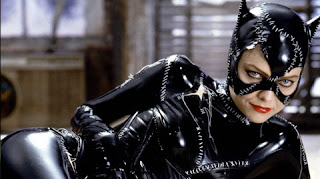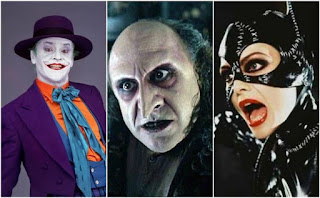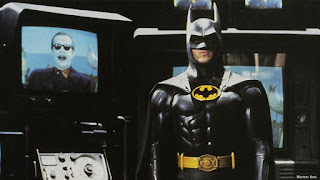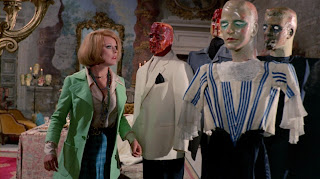Before Christopher Nolan's acclaimed Dark Knight trilogy, before Joel Schumachers Bat-nipple craze, Tim Burton was the man in charge of the Batman film franchise. While his films are sometimes overlooked in favour of some of the more modern incarnations of the character, I feel like it's very important to highlight just how brilliant these films were. The first of these, Batman, was released in 1989 and was followed by a sequel, Batman Returns, three years later. The films came at a time when Batman comics were getting darker, from Frank Miller's The Dark Knight Returns, to Alan Moore's The Killing Joke, Batman was no longer the campy caped crusader of the 1960's. Naturally because of this Burton's films were quite dark as well, maybe not so much by today's standards, but in comparison to other superhero films that came before such as Richard Donner's Superman, these were much darker films. It was because of this that Burton never got to make his third Batman film, his vision was seen as too dark and unsuitable for younger audiences. Burton then left the franchise, Joel Schumacher took over, and the rest is Bat-history. While his run on the franchise was cut short, Burton's Batman films are by far some of the best, in some aspects even better than Nolan's. Here are some reasons why his films deserve to be better remembered.
The Visuals
Tim Burton is a director known for his unique visual style, and his Batman films are the perfect representation of this. Burton put the goth in Gotham City, his version of Batman's hometown is a sprawling, dark metropolis that looks like a hybrid of noir cinema and the German expressionist movement. Full of pointed skyscrapers, gothic cathedrals, and dark alleyways, this version of Gotham was the perfect playground for a darker incarnation of Batman. This version of Gotham felt otherworldly almost, it didn't look like a normal city but rather something taken straight out of The Cabinet of Dr. Caligari. It really made the films feel like comic book films and made them stand out from other similar films. Along with this, the costumes also enhanced this otherworldly, gothic atmosphere in Burton's films. From Penguin's black top hat and suit, to Catwoman's stitched-up, black leather jumpsuit, these were darker incarnations of familiar characters. The costumes helped these characters fit into this gothic landscape and set them apart from previous incarnations. My only criticism of the production design is in Batman Returns and the fact that it was a closed set. The city feels much smaller and much more confined in the second film, and it feels like we're visiting the same locations again and again, almost like a play. Despite this, however, it's still a beautiful looking set.
The Love Interests
One of the biggest issues with modern superhero films is the treatment of the love interest. Normally, they are reduced to underdeveloped, supporting characters, who seem to be there for the sole purpose of being a love interest and nothing more. Most of the time they are stripped of any depth or personality, being left as one-dimensional characters. However, the love interests in Burton's films are treated a little differently. In the first film, Kim Basinger takes on the role of resident reporter Vicki Vale, the love interest of the piece. Vale is front and center for a considerable part of the film and her relationship with Bruce Wayne is a major part of the story. While she is still a damsel in distress type character, at least she is a damsel in distress with a bit of character development. However, the second film is where we see Burton really make use of the love interest character. In Batman Returns, Michelle Pfeiffer takes on the role of Selina Kyle aka Catwoman. This is as much her film as it is Batman's, and we watch her develop from meek secretary into the vivacious criminal Catwoman. Pfeiffer is phenomenal in the role and to me, is the definitive portrayal of the character, but along with this, her character is given depth. It's not just about Catwoman, but also about Selina Kyle, her feminine liberation, and her relationship with Bruce Wayne. The fact that they both struggle with that sense of duality makes for a really interesting story arc and allows for a much more layered incarnation of Catwoman.
The Villains
Of course, no hero is complete without their villain, and Burton brought some of Batman's greatest rogues to life in both of his films. First of all there was The Joker, portrayed superbly by veteran actor Jack Nicholson. Nicholson brings that signature craziness and applies it to the character to make for a charming, yet terrifying bad guy and the perfect match for Batman. Unlike other incarnations of the character, this version of The Joker has a definite backstory that ties into Batman's past as well. While it does take away that some of that sense of mystery from the character, it allows for a more layered villain with a closer tie to Batman. Three years later, Batman Returns gave us The Penguin, played by Danny DeVito. This version of the character was a lot different from previous incarnations, instead of the gentleman of crime, he was a deformed man who lived in the Gotham sewers where he was raised by penguins from the zoo. This was a much darker and almost disturbing version of the character, he was foul-mouthed, filthy, yet he was also sympathetic to a certain extent. He was a man abandoned at birth who had been rejected by society his entire life, at times you couldn't help feel sorry for the guy. The villains of Burton's films received a considerable amount of development each, and we watch both their stories and Batman's stories play out simultaneously, almost like in Michael Mann's Heat. Burton understood how integral the villains were to these stories and provided a number of terrifying, yet layered characters for Batman to face off against. It's another thing many modern superhero films tend to neglect and it's something I think that they could take note of.
Batman Himself
Michael Keaton's Batman wasn't exactly well received upon his announcement, mainly because he was a comedic actor whose physique didn't exactly resemble that of Batman from the comics. It's an understandable criticism to be fair, but regardless, Michael Keaton delivered in a brilliant performance as the caped crusader. Of course, Batman is a dual performance at the end of the day and Keaton was fantastic as both Bruce Wayne and Batman. As Bruce, he was a very troubled individual who always seemed distracted, like his mind was elsewhere. You can tell that he is a character still haunted by his parents death and that it is still the primary motivation for his vigilantism. As Batman however, he is very different. Keaton's Batman is almost like an urban myth, a boogie man who is feared by the criminals of Gotham city. At the beginning of the first film we see two criminals discuss him as though he is some sort of supernatural being, he is an enigma as opposed to just a vigilante. While he may not be the muscle-bound Bat from the comics, Keaton's Batman uses other techniques to overcome his adversaries. He puts to use a wide variety of gadgets and 'toys' to outsmart other criminals as opposed to just beating them down. He is tactical and theatrical, almost as if every night of crime fighting is a performance. While he may seem a bit dated by today's standards, particularly during combat sequences, Keaton's Batman made for a much darker onscreen version of the character and set the standard for Batmen that followed. As Bruce, he was troubled and vulnerable almost, but as Batman he was incredibly formidable.
Also, as a side note, can we take a moment to appreciate Danny Elfman's iconic score?
It is clear that there are a lot of things that modern superhero films can learn from Burton's Batman franchise. First of all, all of the major characters receive an equal amount of development. Not just the protagonist, but the love interest and the antagonists are all layered characters with as much significance to the plot as the eponymous hero. Along with that, they have a distinctly unique visual style that set them apart from other superhero films. Burton's Batman films are easily distinguishable from other ones and set in stone that dark environment for him to inhabit. I would also like to point out that, despite one Crime Alley flashback, neither of Burton's films are Batman origin stories so that's another thing that modern superhero films can learn from. It is now evident why Burton's Batman films are so important and what the superhero genre can learn from them today. They got a lot of things right that some superhero film still fail to do.








